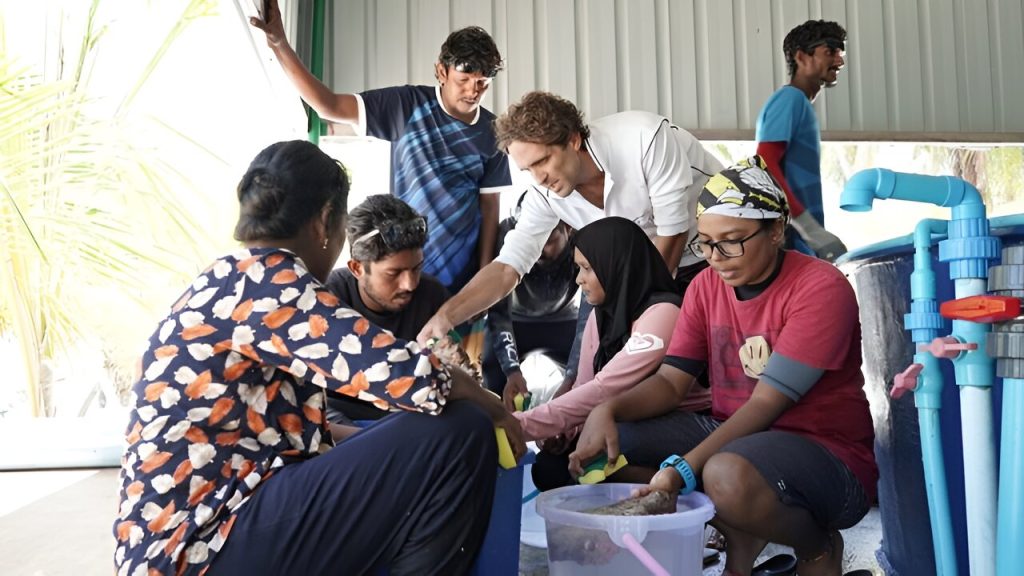CSIRO worked together with MMRI to train local partners in methods to help with coral reef recovery. Here the team is preparing settlement tiles to resettle coral larvae back onto the reef. Credit: CSIRO
The island nation of the Maldives in the Indian Ocean is made up of more than 1,000 small coral islands with white sandy beaches and colorful reefs teeming with marine life.
However, these idyllic islands are now under threat from climate change. Over the last decade, increased sea surface temperatures have resulted in major coral bleaching events. We’ve been working with partners at the Maldives Marine Research Institute to develop and train local participants in larval-based coral restoration methods to assist with reef recovery.
A team effort to help coral recovery
Major coral bleaching in the Maldives has been recorded in 1998, 2016, 2017 and 2020, with minor bleaching occurring in 2022 and 2023. Live coral cover declined to as low as 2% average cover. So, solutions are needed in the Maldives to help with coral recovery.
CSIRO researchers have been working with colleagues at the Maldives Marine Research Institute to train locals in solutions. We have used our experience with the Great Barrier Reef to implement larval-based restoration methods in the context of the Maldives.
We’ve recently published the Standard operating procedures for larval-based restoration of Maldivian coral reefs—a practical guide for practitioners in the Maldives. The document is freely available and is also transferrable for practitioners in other Indo-Pacific coral reef nations.
So, how do you help reefs recover from major disturbance events? Much like us humans and other members of the animal kingdom, it starts with a sperm and an egg.
Spawning new research and knowledge
Corals release their sperm and eggs during coral spawning events. These events usually only happen a few times each year.
We collect the coral spawn and culture it into coral larvae. Then, we release the larvae back onto areas of degraded reef where it will help re-establish corals.
Before we release the larvae, they are sometimes settled onto tiles. We can also release the larvae directly onto the reef. But settling on tiles can help reduce losses of larvae. It also enables early detection of the tiny coral settlers, as they are less than 1 millimeter in size.
On the other hand, direct release of larvae (without the use of tiles) requires less handling and can be more easily scaled up. Both methods help to re-establish populations of coral reefs impacted by disturbances, to aid in long term recovery.
Credit: CSIRO
Future proofing the Maldives reefs
Initially, our researchers delivered the training through a series of online workshops. The interactive sessions included making coral spawn catcher nets from recycled materials such as plastic bottles. Participants were from government, environmental consulting, tourism, and education sectors.
In addition to the online workshops, we rolled out hands-on training to tackle the challenges that locals are facing.
We visited the remote island of Omadhoo to deliver a range of field and lab-based sessions. This included determining when corals are ready to spawn, coral identification and larval culturing.
The team documented when the corals spawned and the precise locations. This information is vital in developing a better understanding of coral reproduction on local reefs in the Maldives.
The training also used resources from the island. A facility normally used for fish aquaculture was repurposed to culture coral larvae before it could be settled onto the reef.
Like many countries in the region, the Maldives relies on its coral reefs for sustaining local livelihoods. Its reefs are critical for coastal protection, as they reduce impacts from waves and storms which cause erosion. And they are also important for economic prosperity. The Maldives depends on the reefs: 58% of the population is employed in the tourism sector and 98% of exports come from reef-associated fisheries.
The workshops and training were the first of their kind in the Maldives. They have boosted the local community’s knowledge to implement actions on their islands and atolls to help in reef restoration. This aims to help build resilience in a changing climate and contribute to future prosperity for the country.
Citation: From larvae to livelihoods: Restoring coral reefs in the Maldives (2023, August 22) retrieved 14 September 2023 from https://phys.org/news/2023-08-larvae-livelihoods-coral-reefs-maldives.html
This document is subject to copyright. Apart from any fair dealing for the purpose of private study or research, no part may be reproduced without the written permission. The content is provided for information purposes only.

